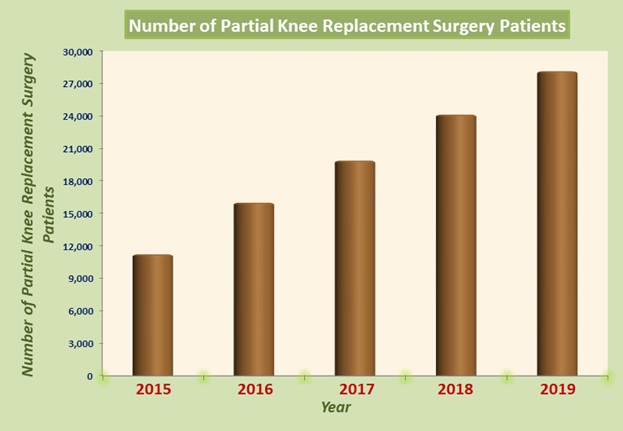Low Cost Partial Knee Replacement Surgery in India

Low Cost Partial Knee Replacement Surgery in India
What is the Cost of Partial Knee Replacement Surgery with Top Hospitals and Top Surgeons in India?
- The average cost of the Partial Knee Replacement Surgery is very high in western countries.
- India is known worldwide for its advanced medical facilities and promising technology for Low Cost Partial Knee Replacement Surgery. Many of the best hospitals for Partial Knee Replacement Surgery can be found in India.
- Partial Knee Replacement Surgery cost in India is much less when compared to any other countries. Also the cost of Partial Knee Replacement Surgery in India is substantially lower than other developed countries of the world.
- The Cost of Partial Knee Replacement Surgery in India can range from approximately Rs. 1,80,000 ($2,200) to Rs. 3,60,000 ($4,500).
Various deciding factors could determine the price of Partial Knee Replacement Surgery in India. These can be broadly classified as Hospital, Medical Team or Patient Dependent factors.
Hospital Factors
- Type of the hospital (Government / Trust / Private).
- Use of insurance, type of insurance or self paid.
- Accreditation of the facility
- Reputation and brand value of the hospital.
Medical Team Factors
- Technology / Approach Used
- Surgery Type
- Type of Anesthesia or Sedation
- Qualification / Expertise of the specialist
- Extent of the surgery needed
Patient Factors
- Patient’s diagnosis
- Patient’s general health
- Room Category selected by the patient
- Other treatment required by the patient in conjunction
The LIST of AVERAGE COST of the Partial Knee Replacement Surgery across TOP 15 cities in India in Indian Rupee (INR) is as follows –
| City | Lowest Cost | Average Cost | Highest Cost |
|---|---|---|---|
| New Delhi | 1,80,000 | 2,55,000 | 3,30,000 |
| Mumbai | 1,90,000 | 2,65,000 | 3,40,000 |
| Chennai | 2,15,000 | 2,90,000 | 3,65,000 |
| Bangalore | 2,00,000 | 2,80,000 | 3,50,000 |
| Hyderabad | 2,40,000 | 3,15,000 | 3,90,000 |
| Ahmedabad | 2,65,000 | 3,40,000 | 4,15,000 |
| Nagpur | 1,65,000 | 2,40,000 | 3,15,000 |
| Pune | 1,90,000 | 2,65,000 | 3,40,000 |
| Gurgoan / Gurugram | 1,80,000 | 2,55,000 | 3,30,000 |
| Kolkata | 2,65,000 | 3,40,000 | 4,15,000 |
| Chandigarh | 1,90,000 | 2,65,000 | 3,40,000 |
| Jaipur | 2,40,000 | 3,15,000 | 3,90,000 |
| Noida | 1,80,000 | 2,55,000 | 3,30,000 |
| Kerala | 2,65,000 | 3,40,000 | 4,15,000 |
| Goa | 2,40,000 | 3,15,000 | 3,90,000 |
- FIVE OF OUR NETWORK SURGEONS HAVE WON AWARDS IN THEIR SPECIALTIES THIS YEAR
- OUR CONSULTANTS WILL BE VISITING CAMEROON, SUDAN, AND ETHIOPIA THIS YEAR
- WE HAVE PARTNERED WITH HOSPITALS IN OMAN, SAUDI ARABIA AND KUWAIT FOR SECOND OPINIONS FROM OUR DOCTORS IN INDIA
- THREE OF OUR PARTNER HOSPITALS HAVE OPENED TELEMEDICINE CENTRES IN AFRICA FOR REACHING OUT TO REMOTE PATIENTS
- ADVANCED ROBOTIC SURGERY IS AVAILABLE ACROSS ALL NETWORK HOSPITALS NOW
Contact Us for a FREE No Obligation Quote & Opinion for Partial Knee Replacement Surgery in India
Our Hospitals Network and Surgery Group are available in 15 cities of India for our patients to access. Kindly fill up the form for a free opinion from our expert team. We shall get you a Free, No Obligation Opinion from India’s best Surgeons and best Hospitals in India. NO CHARGES LEVIED.
Special ALL SERVICES INCLUSIVE Packages available for INTERNATIONAL PATIENTS
Top 10 Surgeons For Partial Knee Replacement In India
- Dr. Ashok Rajgopal
- Dr. Kaushal Malhan
- Dr. Manoj Miglani
- Dr. Rajeev Verma
- Dr. S K S Marya
- Dr. Kamal Bachani
- Dr. Yash Gulati
- Dr. Bhushan Nariani
- Dr. Abhijit Dey
- Dr. Vinay Joshi
- Dr. Manu Bora
- Dr. Raju Vaishya
- Dr. Raghava Dutt Mulukatla
- Dr. Vijay C Bose
- Dr. IPS Oberoi
- Dr. Haresh Manglani
- Dr. B. K. Singh
- Dr. Dhananjay Gupta
- Dr. A B Govindraj
- Dr. Subhash Jangid
- Dr. Nitiraj Oberoi
- Dr. Ramneek Mahajan
- Dr. Dinshaw Pardiwala
- Dr. Ravi V.
- Dr. Pradeep Sharma
- Dr. Sanjay Desai
List of 10 Best Hip Replacement Surgery Hospitals In India
- Fortis Hospital, Mumbai
- Artemis Hospital, Gurgaon
- Fortis Hospital, Bangalore
- Fortis Memorial Research Institute, Gurgaon
- Fortis Rajan Dhall Hospital, New Delhi
- Indraprastha Apollo Hospital, New Delhi
- Shalby Hospital, Ahemdabad
- Kokilaben Hospital, Mumbai
- Nanavati Hospital, Mumbai
- Apollo Hospital, Chennai
- Columbia Asia Hospital, Bangalore
- Asian Joint Reconstruction Institute, Chennai
- Paras Hospitals, Gurgaon
- Jaypee Hospital, Noida
- Fortis Malar Hospital, Chennai
- BLK Max Hospital, New Delhi
- PSRI Multispecialty Hospital, Delhi
- Max Super Specialty Hospital, New Delhi
- Medanta The Medicity, Delhi
- SL Raheja Hospital, Mumbai
- Global Hospitals, Chennai
- Indian Spinal Injuries Center, New Delhi
Partial Knee Replacement
Introduction
Partial knee replacement, also called a unicompartmental knee arthroplasty,’ is a surgery that may be considered for treatment of osteoarthritis of the knee joint. Traditionally, patients have undergone total knee replacement for severe arthritis of the knee joint. In a total knee replacement, all cartilage is removed from the knee joint, and a metal and plastic implant is substituted.
Human beings use their knees in almost all of their daily activities. And if they suffer from pain in the knees, this could be very frustrating. Knee pain can occur for a variety of reasons. Of which, knee arthritis is the most common reason. The doctor can recommend a partial knee replacement surgery in cases where the patient is suffering from debilitating pain. Partial knee replacement surgery is also known as uni-compartmental knee surgery because it is different from a traditional total knee replacement surgery.
A partial knee replacement surgery is relatively less invasive than a traditional total knee replacement surgery. Partial knee replacement surgery in India could be a good option for patients suffering from knee arthritis and from knee injuries. This type of knee replacement surgery is preferred over the traditional total knee replacement surgery because it replaces only the damaged parts of the knee. The post operative hospital stay is also a very short period of one or two day as compared to a total knee replacement surgery. Patients have experienced a shorter recovery period in a partial knee replacement surgery.

Planning your medical trip to India is a very simple process with Joint Replacement Surgery Hospital India
- You just need to fill in our enquiry form and one of our executives will contact you soon.
- +91-9860432255 Call us at the given contact number for any assistance.
- Complete information regarding surgery is provided on our website.
Benefits of partial knee replacement surgery in India
Multiple studies have shown that modern unicompartmental knee replacement performs very well in the vast majority of patients who are appropriate candidates.
The advantages of partial knee replacement over total knee replacement include:
- Minimally invasive surgery with smaller incision:In a unicondylar or partial knee replacement surgery the incision is about three inches and the amount of dissection and the bone removal is much smaller.
- Affordable costs: The total cost of partial knee replacement surgery in India is quite affordable compared to the Western counterparts. Price of partial knee surgery in India is almost 1/4th of the cost of that in the UK and the US.
- Quicker recovery and shorter hospital stay:Compared to a total knee replacement, the recovery time and the number of days of hospital stay in a partial knee replacement is lesser.
- Less blood loss:Partial knee replacement is performed by making a small incision and hence a blood transfusion is infrequently needed. The amount of blood loss is much lesser when compared to a total knee replacement.
Less waiting time: The waiting time is less for surgery in India and we will help you access the Affordable Hospital for Partial Knee Replacement Surgery in India.
Our Treated Patient Experience – Mr. Bryan Tang from Singapore about his Low Cost Partial Knee Replacement Surgery.
Knee pain is probably one of the worst ailments that an individual can ever suffer from. For me, it was so persistent that I used to dread even climbing the stairs in my home most of the times. My co-worker was familiar with my suffering and connected me with Joint Replacement Surgery Group in India, a group of orthopedic surgeons and top most hospitals. My doctor there was an expert while explaining me the entire procedure, duration, cost involved and time of recovery and a master while performing the partial knee replacement surgery.
Candidates for partial knee replacement surgery
The minimally invasive partial knee replacement is indicated in patients who have severe arthritis of the knee that have failed conservative treatments may consider this procedure. Conservative measures may include, but are not limited to, medications (such as Advil, Naprosyn, Celebrex, and Vioxx), cortisone injections, strengthening exercises, and weight loss. If these treatments are not adequate, and you as a patient are not satisfied, then surgical procedures may be considered.
The partial knee surgery may be possible if the arthritis in the knee is confined to a limited area. If the arthritis is widespread, then the partial knee replacement is NOT appropriate, and should not be considered. In addition, the partial knee surgery is recommended in patients who are:
- Older than 55 years
- Not obese
- Relatively sedentary
- Have intact ligaments (specifically the ACL)
If these qualifications are not met, then the minimally invasive partial knee surgery may not be as successful. Unfortunately, many patients are therefore ineligible for this minimally invasive procedure.
Most patients who seek surgical management have arthritis that is too advanced for the minimally invasive partial knee replacement procedure. Because surgical treatment is considered a ‘last-resort’ by most patients, by the time surgery is necessary, their arthritis is too advanced to consider this minimally invasive procedure. If partial knee replacement is done in a patient who is a poor candidate, failure rates can be high, and conversion to a traditional total knee surgery may be more difficult.
Long term result with partial knee replacement surgery
The long-term results are very good when the minimally invasive partial knee replacement is done in the right patients. Older studies showed very poor results of the partial knee replacement, but these results are thought to be due to poor patient selection. If the minimally invasive procedure is done on a patient with too widespread arthritis, the results are very likely to be less than satisfactory. If your doctor does not recommend a partial knee replacement, you may be in this situation. If this is the case, further conservative treatment (e.g. injections, physical therapy, medications, etc.), or total knee surgery are the best options.
If you are really seeking for Total Hip Replacement Surgery, kindly fill up the form for a free consultation with our surgeons. You will be provided with thorough analysis and suggestions regarding the Total Hip Replacement Surgery you are seeking.
Partial knee replacement surgery
Before surgery
On the day of the surgery, you will likely be admitted to the Partial Knee Replacement Surgery Hospital in India.
Before your procedure, a doctor from the anesthesia department will evaluate you. He or she will review your medical history and discuss anesthesia choices with you. You should also have discussed anesthesia choices with your surgeon during your preoperative clinic visits. Anesthesia can be either general (you are put to sleep) or spinal (you are awake but your body is numb from the waist down).
Your surgeon will also see you before surgery and sign your knee to verify the surgical site.
Surgical procedure
A partial knee replacement operation typically lasts between 1 and 2 hours.
Your surgeon will make an incision at the front of your knee. He or she will then explore the three compartments of your knee to verify that the cartilage damage is, in fact, limited to one compartment and that your ligaments are intact. If your surgeon feels that your knee is unsuitable for a partial knee replacement, he or she will instead perform a total knee replacement. He or she will discuss this contingency plan with you before your operation to make sure that you agree with this strategy.
If your knee is suitable for a partial knee replacement, your surgeon will use special saws to remove the cartilage from the damaged compartment of your knee and will cap the ends of the femur and tibia with metal coverings. The metal components are generally held to the bone with cement. A plastic insert is placed between the two metal components to allow for a smooth gliding surface.
After the surgery, you will be taken to the recovery room, where you will be closely monitored by nurses as you recover from the anesthesia. You will then be taken to your hospital room.
Complications
As with any surgical procedure, there are risks involved with partial knee replacement. Your surgeon will discuss each of the risks with you and will take specific measures to help avoid potential complications.
Although rare, the most common risks include:
- Blood clots. Blood clots in the leg veins are the most common complication of knee replacement surgery. Blood clots can form in the deep veins of the legs or pelvis after surgery. Blood thinners such as warfarin (Coumadin), low-molecular-weight heparin, aspirin, or other drugs can help prevent this problem.
- You will be given antibiotics before the start of your surgery and these will be continued for about 24 hours afterward to prevent infection.
- Injury to nerves or vessels. Although it rarely happens, nerves or blood vessels may be injured or stretched during the procedure.
- Continued pain.
- Risks of anesthesia.
Recovery
Because a partial knee replacement is done through a smaller, less invasive incision, hospitalization is shorter, and rehabilitation and return to normal activities is faster.
Patients usually experience less postoperative pain, less swelling, and have easier rehabilitation than patients undergoing total knee replacement. In most cases, patients go home 1 to 3 days after the operation.
You will begin putting weight on your knee immediately after surgery. You may need a walker, cane, or crutches for the first several days or weeks until you become comfortable enough to walk without assistance.
A physical therapist will give you exercises to help maintain your range of motion and restore your strength. You will continue to see your orthopaedic surgeon for follow-up visits in his or her clinic at regular intervals.
You will most likely resume your regular activities of daily living by 6 weeks after surgery.
Why Choose Joint Replacement Surgery Hospital India for Partial Knee Replacement Surgery?
Joint Replacement Surgery Hospital India offers highest quality bone and joint health care with attentiveness, care and compassion to meet the needs of the patients and their loved ones. The medical team includes board-certified orthopedic surgeons who are familiar with all the aspects of the musculoskeletal system. Our hospital uses the most advanced technologies available for the orthopaedic procedures and has a lower complication rate.
If you are really seeking for Partial Knee Replacement Surgery, kindly fill up the form for a free consultation with our surgeons. You will be provided with thorough analysis and suggestions regarding the Partial Knee Replacement Surgery you are seeking.
How many patients underwent Partial Knee Replacement Surgery in India in the last 5 years?
- In recent years, India has emerged as a medical hub for patients looking for affordable, accessible and efficient low cost Partial Knee Replacement Surgery.
- Some of the most coveted Partial Knee Replacement Surgery Treatment hospitals in the world are found in India. The country is known for offering advanced medical facilities at the most reasonable cost.
- Early diagnosis, surgery or treatment helps to enhance the chances of a successful outcome.
- An average increase of 15 to 20 percent annually has been observed in the number of patients in the last 5 years.
- The Indian Partial Knee Replacement Surgery hospitals deliver advanced health care and highest quality services backed by elaborate infrastructure and lower treatment cost.
- Since all the staff in hospitals, including nurses, physiotherapists, doctors, surgeons are well-trained in English speaking, patients from any part of the world coming to India feel comfortable in communicating their problems without any issues.
Here are the approximate figures of the patients underwent Partial Knee Replacement Surgery in the last 5 years in India :
Are you looking for affordable cost of Partial Knee Replacement Surgery in Top Hospitals of India?
Please consult us to get FREE Quotes, Opinions from TOP Hospitals and BEST Surgeons of India for Partial Knee Replacement Surgery.
Listen to the Voices of Our Happy Patients
FAQ’s
Yes. Partial knee replacement, partial knee resurfacing surgery, unicompartmental knee replacement, and unicondylar knee replacement all refer to the same procedure.
There are no strict recommendations, but in general, partial knee replacements are appropriate for patients over 40 years old who meet other eligibility criteria.
The primary purpose of this procedure is relief of pain. Second is to enhance walking ability. Finally, restoring anatomy as close as possible to normal. The prosthesis is designed for walking or brisk walking, not running.
A general anasthetic means you will be unconscious during the surgery and should have no recollection aside from going to sleep and waking up. A local anasthetic allow you to remain conscious. Typically we use a spinal anesthetic which blocks all pain in the area while leaving the patient conscious. This is a personal choice and can be discussed with the anesthesiologist.
Knee prostheses or implants are made of metal and plastic. These surfaces are designed to glide smoothly against one another just as cartilage does in a healthy knee.
Although not all patients are able to return to unrestricted sport, many patients are able to resume biking, tennis and skiing.
As with any joint replacement surgery, complications may include instability of the knee, loosening of the implant, infection, nerve injury and deep vein thrombosis. Generally, complications occur less frequently after partial knee replacement than they do following total knee replacement. Be sure to discuss any concerns you have regarding these or other issues with your surgeon.
All surgeries result in some pain. We have robust systems and resources dedicated to address post-operative pain management. While pain varies by patient, typically patients experience less pain and stiffness following partial knee replacement than they do after total knee replacement. After partial knee replacement surgery, most patients receive 7-14 days of narcotic medications, but HSS also offers a limited narcotic pathway for patients who do not tolerate narcotic medications well.
Partial knee replacement will address the arthritis that is present in the particular compartment of the knee that is affected. However, there is no guarantee that arthritis will not develop elsewhere in the knee. Should this occur, surgical revision to a total knee replacement may be necessary.
A well-done partial knee replacement in an appropriately selected patient can have a survival rate that is comparable to that achieved with a total knee replacement in the first decade following surgery. The literature suggests that after the second decade, the revision rate may be somewhat higher for partial knee surgery than for total knee surgery.
Final range of motion in compartment procedures is usually comparable to preoperative range of motion.
Usually, full weight bearing is allowed immediately after the operation. Mobilization after surgery is important to prevent complications (deep venous thrombosis/pulmonary embolism) and to resume independent self-care as soon as possible.
The prosthesis is designed for walking/brisk walking – not running. That said, it is possible that some low impact exercises that avoid pivoting and twisting may be advantageous. Consult your doctor for specific information.
A brace is usually not required.
You can most definitely choose hotels as per your convenience to you and your budget.
Many hospitals in India have language translators to help you communicate better and effortlessly with the doctors and medical staff.
Our Country Specific Services






 English
English Arabic
Arabic French
French Bangla
Bangla Russian
Russian





